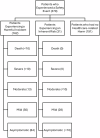Medico-Legal Complaints Against Dermatologists: Data From the Canadian Medical Protective Association, 2013 to 2022
- PMID: 39315521
- PMCID: PMC11585184
- DOI: 10.1177/12034754241275989
Medico-Legal Complaints Against Dermatologists: Data From the Canadian Medical Protective Association, 2013 to 2022
Abstract
Background: Medico-legal complaints against physicians are a significant source of anxiety and could be associated with defensive medical practices that may correlate with poor patient outcomes. Little is known about patient concerns brought to regulatory bodies and courts against dermatologists in Canada.
Objective: To characterize factors contributing to medico-legal complaints brought against dermatologists in Canada.
Methods: The Canadian Medical Protective Association (CMPA) repository was queried for all closed cases involving dermatologists over the past decade. Aggregate, anonymized data was reviewed and case outcomes, patient harm, and contributing factors were extracted.
Results: Nearly one-fifth of all dermatologists who are CMPA members have been named in at least one medico-legal case between 2013 to 2022. A total of 396 civil-legal actions or College complaint cases involving dermatologists were closed at the CMPA during this timeframe. The most common patient allegations were deficient assessment (34%), diagnostic error (28%), and unprofessional manner (22%). Nearly half of patients experienced a harmful event, the majority of which were asymptomatic or mild. The most frequently identified contributing factors related to providers were poor clinical decision making (n = 73), lack of situational awareness (n = 67), and conduct and boundary issues (n = 59). Team factors included a breakdown of communication with patients (n = 124).
Conclusions: Improved communication with patients for informed consent, treatment plans, clinical follow-up, and documentation of thorough clinical patient assessments can improve patient satisfaction and health outcomes, and mitigate dermatologists' medico-legal risk.
Keywords: CMPA; informed consent; lawsuit; medico-legal; professionalism.
Conflict of interest statement
Declaration of Conflicting InterestsThe author(s) declared no potential conflicts of interest with respect to the research, authorship, and/or publication of this article.
Figures
Similar articles
-
Medico-legal risk of infectious disease physicians in Canada: A retrospective review.J Assoc Med Microbiol Infect Dis Can. 2024 Jan 16;8(4):319-327. doi: 10.3138/jammi-2023-0022. eCollection 2024 Jan. J Assoc Med Microbiol Infect Dis Can. 2024. PMID: 38250623 Free PMC article.
-
Medico-legal risks of point-of-care ultrasound: a closed-case analysis of Canadian Medical Protective Association medico-legal cases.Ultrasound J. 2024 Feb 23;16(1):16. doi: 10.1186/s13089-024-00364-7. Ultrasound J. 2024. PMID: 38396310 Free PMC article.
-
Promoting Best Practices in Assisted Human Reproduction.J Obstet Gynaecol Can. 2023 Sep;45(9):661-664. doi: 10.1016/j.jogc.2023.06.002. Epub 2023 Jun 13. J Obstet Gynaecol Can. 2023. PMID: 37315784
-
An Analysis of Medico-legal Claims against Dermatologists in Australia from a Single Medical Indemnity Insurer.J Law Med. 2018 Jul;25(4):1100-1105. J Law Med. 2018. PMID: 29978687 Review.
-
Soft Tissue Filler Therapy and Informed Consent: A Canadian Review.J Cutan Med Surg. 2022 Jan-Feb;26(1):50-56. doi: 10.1177/12034754211032542. Epub 2021 Jul 26. J Cutan Med Surg. 2022. PMID: 34310242 Free PMC article. Review.
Cited by
-
Analysis of the causes of improper medical decision-making in medical damage liability disputes in China: a text mining approach.BMC Health Serv Res. 2025 Aug 20;25(1):1112. doi: 10.1186/s12913-025-13177-8. BMC Health Serv Res. 2025. PMID: 40836339 Free PMC article.
References
-
- Schaffer AC, Yu-Moe CW, Babayan A, Wachter RM, Einbinder JS. Rates and characteristics of medical malpractice claims against hospitalists. J Hosp Med. 2021;16(7):390-396. - PubMed
-
- Payerchin R. See you in court: 31% of physicians get sued during their careers. MedicalEconomics. 2023. Cited March 15, 2024. https://www.medicaleconomics.com/view/see-you-in-court-31-of-physicians-...
-
- Cunningham W, Dovey S. The effect on medical practice of disciplinary complaints: potentially negative for patient care. N Z Med J. 2000;113(1121):464-467. - PubMed
-
- Cunningham W. The immediate and long-term impact on New Zealand doctors who receive patient complaints. N Z Med J. 2004;117(1198):U972. - PubMed
MeSH terms
LinkOut - more resources
Full Text Sources
Miscellaneous



